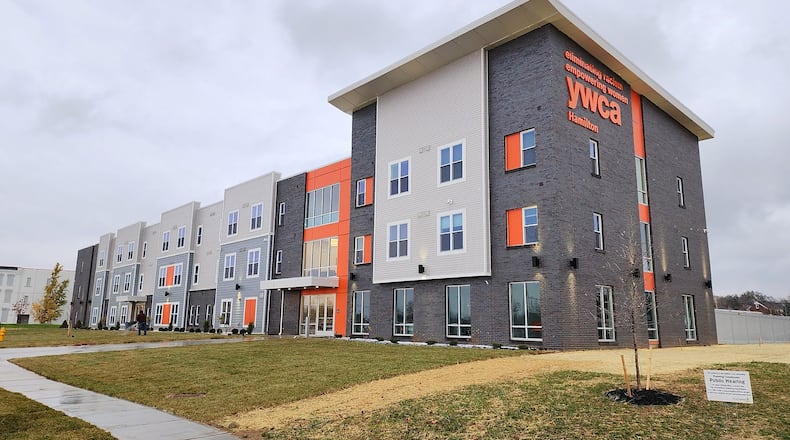They want to build a three-story building with two and three bedroom units for up to 55 families. The village of New Miami has accepted their $200,000 bid for land — the sale is contingent on the Y receiving grant funding — that is adjacent to the old Family Dollar store on U.S. 127.
Waters-Connell told the Journal-News the LIHTC program is highly competitive with relatively few dollars available, so it is a long-shot.
“Everything hinges on the low income tax credit award,” she said adding without it the project is a no-go.
Penny Martin, director of Public Affairs for OHFA, told the Journal-News this year her agency awarded a total of $34 million for 24 projects, but only $5 million — for three projects — of it was for “service enriched housing” which is the category the YWCA project fits into. They don’t have the amount available for next year yet.
According to the state finance agency website the LIHTC program, “gives investors a dollar-for-dollar reduction in their federal tax liability in exchange for providing investment equity to develop affordable rental housing. Investors’ equity contribution helps developments maintain financial viability while restricting rents to affordable levels. In return, investors receive tax credits paid in annual allotments, generally over 10 years. LIHTC-financed developments must keep the units rent restricted and available to low-income tenants for at least 30 years.”
Grant applications are scored on a point system and Waters-Connell told the commissioners recently the New Miami location has some challenges.
“The largest deficit in New Miami right now would be medical services that are available like a clinic that offers prescription services,” Waters-Connell said. “There is a vacant building, the old Family Dollar right next to the property we’re intending to purchase and we would love to see some coordination with the village of New Miami perhaps to reinvigorate the use of that property.”
She told the Journal-News she is aware it is not the village or the county’s job to bring medical services to town, that’s why they are “encouraging conversations around this” but it would be totally up to a healthcare provider to step up and bring services.
County Administrator Judi Boyko also raised questions about the village’s ability to provide fire, police and infrastructure services for the project and whether there are “sufficient resources” like jobs for residents of the complex, among other issues.
In an email addressing Boyko’s concerns Waters-Connell said village services, with the possible exception of police coverage, are adequate and they are working with the Butler County Regional Transit Authority to get a bus stop so residents can get to Hamilton and Middletown for employment if there is nothing available locally.
New Miami Mayor Jewel Hensley told the Journal-News the village is working to find ways to beef up their police department and generally make improvements on a number of fronts. She noted if the YWCA is successful in securing funding the complex won’t be open until the end of 2027, so they have time.
Water-Connell said another component of the project is that it is “supportive” housing, “this is for families fleeing domestic violence, however we expect, given the nature of their trauma that they are going to need additional support and our intent is to provide 24-hour staffing in the facility.”
The YWCA initially tried build up to 37 permanent supportive housing units in Oxford but residents resisted. Waters-Connell said it appeared the Oxford city council was prepared to accept the project and grant necessary re-zoning but “it was the citizens that were not ready.”
About the Author
